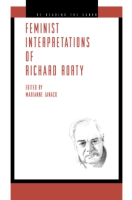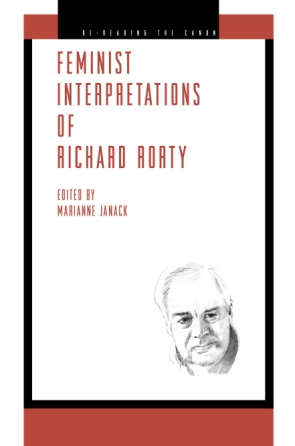Feminist Interpretations of Richard Rorty
Edited by Marianne Janack
When Richard Rorty died on June 8, 2007, obituaries lionized him as one of the “world’s most influential cultural philosophers” and as a thinker whose work covered a wide and varied terrain of literature, philosophy, politics, aesthetics, and cultural critique. Most famous for his rejection of the analytic tradition, Rorty had a relationship to the philosophical canon, and the discipline of philosophy, that was as fraught and full of tensions as it is for most feminist philosophers. Rorty chose to use his 1990 Tanner Lecture on Human Values (the text of which is the first chapter in this volume) to side with feminists Marilyn Frye, Catherine MacKinnon, and Adrienne Rich, who tried to show the importance of opening up new logical space within which women’s voices could be heard.
- Description
- Bio
- Table of Contents
- Sample Chapters
- Subjects
Feminist Interpretations of Richard Rorty presents classic and new essays on Rorty’s engagement with feminist philosophy, including essays about the relevance for feminism of pragmatism, philosophy, rhetoric, realism, and liberalism. The chapters in this volume not only take up Rorty’s conversation with feminism but also distill the debates that were the central concern of feminist theory in the late twentieth century and that continue to demand our responses, perhaps in slightly different forms, in the beginning of the twenty-first.
In addition to the editor, the contributors are John C. Adams, Linda Martín Alcoff, Sharyn Clough, Nancy Fraser, Sabina Lovibond, Alessandra Tanesini, Georgia Warnke, and Stephen R. Yarbrough.
Marianne Janack is the Sidney Wertimer Associate Professor of Philosophy at Hamilton College.
Contents
Preface
Nancy Tuana
Acknowledgments
Introduction
Marianne Janack
1. Feminism and Pragmatism
Richard Rorty
2. From Irony to Prophecy to Politics: A Reply to Richard RortyNancy Fraser
3. Feminism and Pragmatism: A Reply to Richard Rorty
Sabina Lovibond
4. Hope, Truth, and Rhetoric: Prophecy and Pragmatism in Service of Feminism’s Cause
John C. Adams
5. Feminism, Ideology, and Deconstruction: A Pragmatist View
Richard Rorty
6. Democracy and Interpretation
Georgia Warnke
7. Rorty’s Antirepresentationalism in the Context of Sexual Violence
Linda Martín Alcoff
8. Drawing Battle Lines and Choosing Bedfellows: Rorty, Relativism, and Feminist Strategy
Sharyn Clough
9. Richard Rorty, Feminism, and the Annoyances of Pragmatism
Stephen R. Yarbrough
10. Naturalism and Normativity: Rorty and Barad
Alessandra Tanesini
Selected Bibliography
Contributors
Index
Preface
Nancy Tuana
Take into your hands any history of philosophy text. You will find compiled therein the “classics” of modern philosophy. Since these texts are often designed for use in undergraduate classes, the editor is likely to offer an introduction in which the reader is informed that these selections represent the perennial questions of philosophy. The student is to assume that she or he is about to explore the timeless wisdom of the greatest minds of Western philosophy. No one calls attention to the fact that the philosophers are all men.
Though women are omitted from the canons of philosophy, these texts inscribe the nature of woman. Sometimes the philosopher speaks directly about woman, delineating her proper role, her abilities and inabilities, her desires. Other times the message is indirect—a passing remark hinting at women’s emotionality, irrationality, unreliability.
This process of definition occurs in far more subtle ways when the central concepts of philosophy—reason and justice, those characteristics that are taken to define us as human—are associated with traits historically identified with masculinity. If the “man” of reason must learn to control or overcome traits identified as feminine—the body, the emotions, the passions—then the realm of rationality will be one reserved primarily for men, with grudging entrance to those few women who are capable of transcending their femininity.
Feminist philosophers have begun to look critically at the canonized texts of philosophy and have concluded that the discourses of philosophy are not gender-neutral. Philosophical narratives do not offer a universal perspective, but rather privilege some experiences and beliefs over others. These experiences and beliefs permeate all philosophical theories whether they be aesthetic or epistemological, moral or metaphysical. Yet this fact has often been neglected by those studying the traditions of philosophy. Given the history of canon formation in Western philosophy, the perspective most likely to be privileged is that of upper-class white males. Thus, to be fully aware of the impact of gender biases, it is imperative that we re-read the canon with attention to the ways in which philosophers’ assumptions concerning gender are embedded within their theories.
This series, Re-Reading the Canon, is designed to foster this process of reevaluation. Each volume will offer feminist analyses of the theories of a selected philosopher. Since feminist philosophy is not monolithic in method or content, the essays are also selected to illustrate the variety of perspectives within feminist criticism and highlight some of the controversies within feminist scholarship.
In this series, feminist lenses focus on the canonical texts of Western philosophy, both those authors who have been part of the traditional canon, and those philosophers whose writings have more recently gained attention within the philosophical community. A glance at the list of volumes in the series reveals an immediate gender bias of the canon: Arendt, Aristotle, Beauvoir, Derrida, Descartes, Foucault, Hegel, Hume, Kant, Locke, Marx, Mill, Nietzsche, Plato, Rousseau, Wittgenstein, Wollstonecraft. There are all too few women included, and those few who do appear have been added only recently. In creating this series, it is not my intention to rectify the current canon of philosophical thought. What is and is not included within the canon during a particular historical period is a result of many factors. Although no canonization of texts will include all philosophers, no canonization of texts that excludes all but a few women can offer an accurate representation of the history of the discipline, as women have been philosophers since the ancient period.
I share with many feminist philosophers and other philosophers writing from the margins of philosophy the concern that the current canonization of philosophy be transformed. Although I do not accept the position that the current canon has been formed exclusively by power relations, I do believe that this canon represents only a selective history of the tradition. I share the view of Michael Bérubé that “canons are at once the location, the index, and the record of the struggle for cultural representation; like any other hegemonic formation, they must be continually reproduced anew and are continually contested.”
The process of canon transformation will require the recovery of “lost” texts and a careful examination of the reasons such voices have been silenced. Along with the process of uncovering women’s philosophical history, we must also begin to analyze the impact of gender ideologies upon the process of canonization. This process of recovery and examination must occur in conjunction with careful attention to the concept of a canon of authorized texts. Are we to dispense with the notion of a tradition of excellence embodied in a canon of authorized texts? Or, rather than abandon the whole idea of a canon, do we instead encourage a reconstruction of a canon of those texts that inform a common culture?
This series is designed to contribute to this process of canon transformation by offering a re-reading of the current philosophical canon. Such a re-reading shifts our attention to the ways in which woman and the role of the feminine are constructed within the texts of philosophy. A question we must keep in front of us during this process of re-reading is whether a philosopher’s socially inherited prejudices concerning woman’s nature and role are independent of her or his larger philosophical framework. In asking this question attention must be paid to the ways in which the definitions of central philosophical concepts implicitly include or exclude gendered traits.
This type of reading strategy is not limited to the canon, but can be applied to all texts. It is my desire that this series reveal the importance of this type of critical reading. Paying attention to the workings of gender within the texts of philosophy will make visible the complexities of the inscription of gender ideologies.
Mailing List
Subscribe to our mailing list and be notified about new titles, journals and catalogs.




